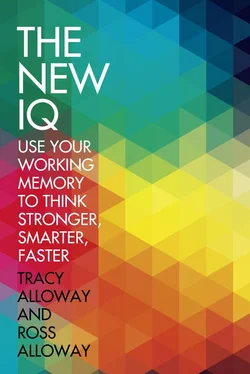The Lure of Instant Gratification
In our I want it now society, we want immediate satisfaction. Our quest for the fleeting thrill we get from an impulsive purchase or from eating an entire bag of chips when we’re on a diet, relegates working memory to the sidelines of the decision-making process. This is why we so often opt for smaller, more immediate rewards rather than waiting for bigger and better things, like a fat bank account, or a slim waistline.
Being squeezed for time burdens working memory and makes you more likely to give in to impulse—whether you’re confronted with a limited-time-offer purchase, for example, or trying to select the correct answers while taking a timed test, or even when faced with an ultimatum from a significant other to get engaged now or break up. In Chapter 2, we look at how this plays out on eBay, where the ticking clock can overwhelm your working memory, making it more likely you will give into impulse and pay more than you should.
When the pressure is on, it can overload your working memory and sabotage your performance at work, at school, or even on the pitch. Think of the angst that every team feels in a penalty shoot-out against Germany. Their reputation for flawless penalties transforms some of the world’s best players into tripping toddlers. Stuart Pearce, Chris Waddle, Gareth Southgate—all these England players stepped up to take penalties in shoot-outs against Germany—and stress caused them to miss. Goodbye, glory.
Sorry to burst your bubble, but if you’ve been dreaming about the day you can say good-bye to the 9-to-5 grind and hello to retirement, we have to inform you that retirement makes you dumb. Retirement marks not just a reduction of work, but also a reduction in thinking and, consequently, a reduction in your working memory strength.
If you’ve ever slammed your hand in the car door or spilled boiling water on your lap, you know that it’s tough to think clearly when you’re in pain. Scientists have discovered that pain, including chronic aches like a sore back or knee, may disrupt working memory.
What does romance have to do with working memory? In a 2012 study, Jeffrey Cooper and colleagues at Trinity College Dublin discovered that the PFC plays a big role in the first flush of attraction. They scanned the brains of nineteen- to thirty-one-year-olds on the prowl and showed them photos of potential mates. Some photos caused a burst of activity in parts of their PFC. Participants then went to a speed-dating event, and the researchers discovered that the stronger the activation in the PFC, the more likely the participants were to pursue a second date. If you find your working memory working overtime when you first meet someone, there is a good chance that you’ll take a chance and ask them out.
Some exciting new research by Johan Karremans at Rodboud University in the Netherlands offers insight into why men often become tongue-tied when meeting a woman whom they find attractive. He found that men’s scores on a working memory test were lower after they’d had a brief conversation with a beautiful woman. And intriguingly, he did not find this “attraction effect” in women after they’d had a conversation with a handsome man. His interpretation of his results is that because traditional gender roles require men to take the initiative in engaging in conversation with a potential mate, their working memories are more taxed by the process.
Video Games, Smoking, and Overeating
Whatever your guilty pleasure may be, it can take your working memory offline. A healthy working memory inhibits self-destructive habits, but engaging too often in highly addictive behaviors causes changes in the brain. Basically certain brain regions gang up and recruit your working memory into fulfilling the addictive desire, rather than stopping it.
How Working Memory Can Be Improved
As little as five years ago, people thought that working memory was fixed—that you were stuck with what you were born with. But research is showing otherwise. Think of working memory as like a rubber band. Some rubber bands are big, and some are small, but they can all be stretched. In the same way, we’re all born with a certain level of working memory. But regardless of our genetic predisposition for a strong or not-so-strong working memory, nearly every one of us can stretch it to get a bigger advantage in life.
The lessons we’ve learned from our work with students to train their working memory with the Jungle Memory software Ross developed have confirmed that significant improvements are possible. Take the case of a young girl named Jasmine. She was often told that she needed to “try harder,” but despite doing her best, she couldn’t keep up at school or follow her mom’s instructions at home. After being diagnosed with a working memory deficit, Jasmine used the Jungle Memory program for eight weeks and saw dramatic results. She improved her working memory by over 800 percent (an amazing result!) and started winning achievement awards at school.
Tracy has also seen significant improvements in clinical trials when she tested the working memory of students with reading and math difficulties. After they had trained regularly for eight weeks with Jungle Memory , they showed fantastic improvements in working memory; even more exciting was that their grades also improved—generally a whole grade point, such as from a C to B or a B to an A. Another study showed that they maintained all of these improvements eight months later.
Throughout this book, we introduce you to a host of simple working-memory-training exercises, so that you can get started on getting your working memory in shape as you read. And at the end of the book, we provide a quick hits training manual that you can use on the go to help keep your working memory sharp.
In the chapters that follow, we first draw on more than a decade of research and practical experience to explore why working memory is so vital in our lives and the role it plays in our general work aptitude and in our general life happiness, as well as in learning, overcoming addiction, and achieving in sports. In part II, we show you how working memory changes during our lives from childhood to old age and introduce encouraging evidence about how we can keep our working memory in good shape during later life. We also present specific tools for strengthening working memory—from the most effective brain training programs, to the best foods to eat (some of them may surprise you), to small but crucial tweaks in your daily habits that can make a big difference for your working memory. The chapters in part III imagine a future in which the world is designed to give our working memory the best advantage and look at groundbreaking research on how it gave our ancestors an evolutionary advantage.
To help you get a basic understanding of the strength of your working memory, here are two quick tests. For a more detailed measure of your working memory power, take the full online test at http://testwm.com.
Test 1
Below is a list of three-letter words. Don’t look at it! Ask a friend to quiz you using the list of words. In level 1 of this test, your friend is going to read aloud two words, like cat and bat . You have to try to remember the two words, reverse them, and repeat them backward. Tab. Tac. In level 2, you have to do the same with three words. In level 3, it’s four words. Most people are able to do level 1, but you need a strong working memory to complete levels 2 and 3 correctly.
Читать дальше












